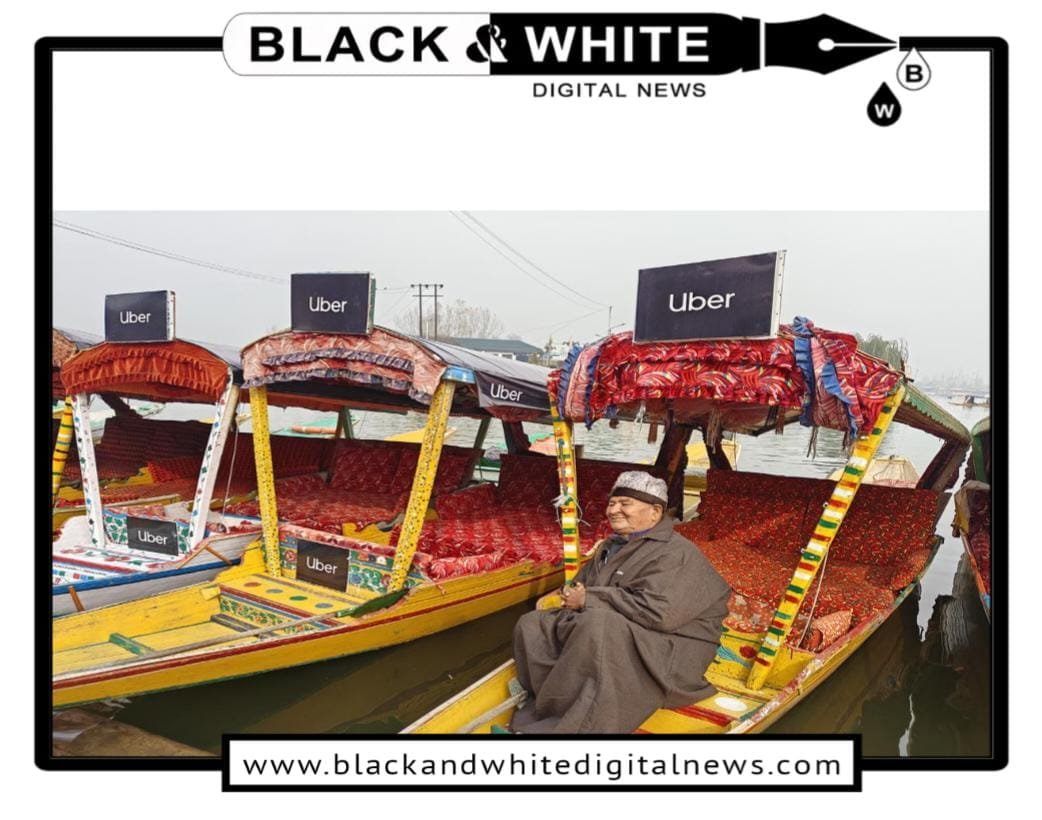Uber on Dal: A Modern Paddle Through Kashmir’s Timeless Waters.
||Black and White Digital News||
||Tejveer Singh December 03, 2024||
KASHMIR: On a crisp December morning, Dal Lake, with its silvery expanse glimmering under the winter sun, reflects more than just the beauty of Kashmir—it mirrors its contradictions. Amid the tranquil ripples, a sleek black-and-white Uber logo gleams on the prow of an ornate shikara. It’s a sight that seems both out of place and perfectly suited—a juxtaposition of heritage and modernity, of old-world charm and algorithmic convenience.
A year into its Srinagar experiment, Uber’s partnership with the Shikara Union has added a digital twist to Dal Lake’s timeless allure. What might seem like a quirky marketing gimmick to outsiders carries deeper implications in a region where resilience and adaptation have become survival tools.
A ride on the Dal has always been an immersive experience: the soft cadence of a phiran-draped gondolier, the aroma of kahwa wafting through the cold air, and the kaleidoscope of floral cushions inside the boat. For decades, these rides were defined by spontaneity, tourists haggling over fares, gondoliers doubling as storytellers or saffron merchants, and the charm of the unpredictable.
With Uber stepping in, this spontaneity has been replaced with structured convenience. The app promises transparency, set fares, and vetted operators, offering tourists a seamless experience free from the uncertainty of bargaining or unexpected add-ons. At ₹800 per hour, a shikara ride becomes a swipe away, democratizing access for visitors while providing a steady income stream for operators.
For shikara owners like Abdul Razzaq, who has been ferrying passengers since he was 16, the change is bittersweet. “It’s good for business,” he says, his voice tinged with nostalgia. “But the old Kashmir, the one where stories floated with the boats, feels like it’s fading.”
A Jewel’s Fragile Balance:
Dal Lake is more than a postcard-perfect destination; it’s a living, breathing microcosm of Kashmir’s soul. Its history is steeped in poetry and politics, its waters carrying whispers of both tranquility and turmoil. The lake, often described as the “jewel in the crown of Kashmir,” embodies the region’s contrasts: breathtaking beauty juxtaposed with decades of strife.
The introduction of Uber Shikara comes at a time when Kashmir’s tourism industry is witnessing a renaissance. Following the pandemic lull, 2024 brought a record-breaking influx of tourists to Jammu and Kashmir—a statistic hailed by the government as a sign of normalcy. However, beneath this glittering facade lies a narrative of cautious optimism. Locals like Parvez, a young shikara operator, view Uber’s entry as a practical solution to the challenges of a booming industry. “Technology helps, but we need training,” he says. “Not all of us understand how it works, but if it brings tourists, we’ll adapt.”
Yet, as progress sails forward, a quiet worry lingers: Will the precision of technology erode the idiosyncratic charm that makes Dal Lake so special? For some, the lake’s magic lies in its unpolished authenticity, the chaos of negotiation, the serendipity of discovering hidden treasures, the human touch that no app can replicate.
Progress Without Erosion:
Uber’s no-commission policy for shikara rides, a rare corporate gesture of goodwill has garnered praise from the local community. By eliminating middlemen and standardizing fares, the initiative addresses long-standing economic imbalances within the industry. However, as with any transformative change, it comes with its challenges.
The success of Uber Shikara hinges not just on technology but on the empowerment of the operators themselves. Training programs, digital literacy, and local buy-in are crucial for ensuring that this partnership benefits all stakeholders.
Tourists, too, face a choice: to embrace the convenience of pre-scheduled rides or to seek the serendipity of spontaneous exploration. Early feedback suggests that most are opting for the former, drawn by the service’s fairness and ease of use.
In many ways, the Uber Shikara is less a disruption and more an update—a subtle shift in how the lake’s timeless journeys are navigated. The shikara, whether propelled by wooden oars or guided by Google Maps, remains a vessel of history, carrying the weight of Kashmir’s past and the fragile hope of its future.
As the lake mirrors the muted winter sun, it also reflects a deeper truth: Kashmir is a land of paradoxes, where progress and preservation coexist in delicate balance. The Uber Shikara may be a small ripple in Dal Lake’s storied waters, but it embodies a larger narrative—a region embracing change, one paddle stroke at a time.
The question that lingers, like the lake’s misty mornings, is this: Can progress honor the past without eroding it? For now, Dal Lake floats forward, its waters holding both the weight of history and the promise of tomorrow.



